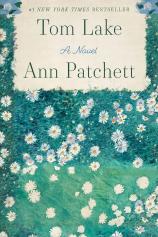Tom Lake
Review
Tom Lake
Many people have a powerful memory of a romantic relationship that flourished in the heat of summer and ended when the nights cooled and the calendar slipped toward fall. In TOM LAKE, her fine ninth novel, Ann Patchett has captured the universality of that experience in an affecting story about love and life, art and ambition, and the enduring embrace of family.
It would be reductionist to call TOM LAKE a COVID-19 novel, but the story’s present action occurs during the spring and summer of 2020, when Emily, Maisie and Nell --- who are all in their 20s --- return to the home of their parents, Joe and Lara, on a fruit farm outside Traverse City, Michigan, to shelter from the pandemic and help with the cherry harvest. With a degree in horticulture, Emily plans someday to take over management of the farm that’s been in the family for five generations. Maisie is enrolled in veterinary school, and Nell, in her last semester of college, harbors dreams of a career as an actress.
"With each addition to her already impressive and diverse body of work, Ann Patchett only burnishes her well-deserved standing as one of America’s most admired novelists. Her sensitivity and skill guarantee that Tom Lake is a place anyone will delight in visiting and regret having to leave."
And it’s acting that’s at the heart of this story, specifically Lara’s experience as a 24-year-old some three decades earlier at a summer stock theater in northern Michigan. It’s a story she parcels out to her daughters in flashbacks integrated seamlessly with the account of the family’s daily life in a virus-imposed isolation that feels more rewarding than confining.
After her preternatural talent in the role of Emily Webb in a college production of Thornton Wilder’s Pulitzer Prize-winning play, “Our Town,” in her native New Hampshire improbably lands her a significant movie role and other acting jobs in Hollywood, the film’s director summons her to Tom Lake to fill in for the actress who suddenly abandoned the role for a movie part.
Almost immediately after she arrives, Lara tumbles into an affair with Peter Duke, a talented actor only four years her senior, but who plays the role of her father in the production. He’s also one of the stars of the theater’s Sam Shepard drama, “Fool for Love,” which features Lara in a a difficult role she’s never performed before. It’s clear that his career is ascendant, and he conducts himself as someone fully possessed of that knowledge.
But Peter and Lara aren’t the only couple in a relationship that summer. Pallace, an actress and dancer who’s performing in the theater’s production of “Cabaret,” also serves as Lara’s understudy in her two roles. She becomes involved with Duke’s older brother Sebastian, a tennis player who abandoned his dream of a professional career for coaching and teaching. Friendship mingles with rivalry to complicate the relations among the members of this foursome.
For several weeks, Lara performs as Emily in her typical exemplary fashion. But as she rehearses for the role of Mae in the challenging “Fool for Love,” she realizes that her undeniable skill channeling her theatrical alter ego can only carry her so far. In all of her roles, she realizes, “I was Emily, because she was the only thing I knew how to do. I had the range of a box turtle. I was excellent, as long as no one moved me.” And as she comes to understand in a fitting benediction for her acting life, “No one gets to go on playing Emily forever.”
Viewing that brief summer interlude from the perspective of a wife and mother in her late 50s, Lara observes, “I learned so many things that summer at Tom Lake and most of those lessons I would gladly have done without.” To reveal how her career as a performer ends and how she eventually makes her way to the family’s Three Sisters Orchard, where she lives a deeply satisfying life far from the footlights, would be giving away too much of the novel’s plot. Suffice it to say that Patchett handles the unfolding of all these events with her characteristic grace.
As with any Patchett novel, the story’s fluidity is only part of the pleasure. The scenes of Lara --- a devoted mother with no illusions about the challenges and joys of that role --- interacting with “my girls, my brilliant young women” are realistic and beautifully rendered, as are her descriptions of life on the modest fruit farm where mere survival is the imperative and prosperity an elusive dream. Her understated prose mirrors one of the most engaging features of the novel --- its artless simplicity --- and the kinship of its sensibility to that of “Our Town” is anything but accidental.
Indeed, as Patchett frankly admits, TOM LAKE is something of a love letter to Wilder and his play, which, she says in an author’s note, has been “an enduring comfort, guide, and inspiration throughout my life.” Some of the novel’s readers undoubtedly will be inspired to return to that beloved work or encounter it for the first time. With each addition to her already impressive and diverse body of work, Ann Patchett only burnishes her well-deserved standing as one of America’s most admired novelists. Her sensitivity and skill guarantee that Tom Lake is a place anyone will delight in visiting and regret having to leave.
Reviewed by Harvey Freedenberg on August 4, 2023
Tom Lake
- Publication Date: April 1, 2025
- Genres: Fiction
- Paperback: 320 pages
- Publisher: Harper Perennial
- ISBN-10: 0063327538
- ISBN-13: 9780063327535




